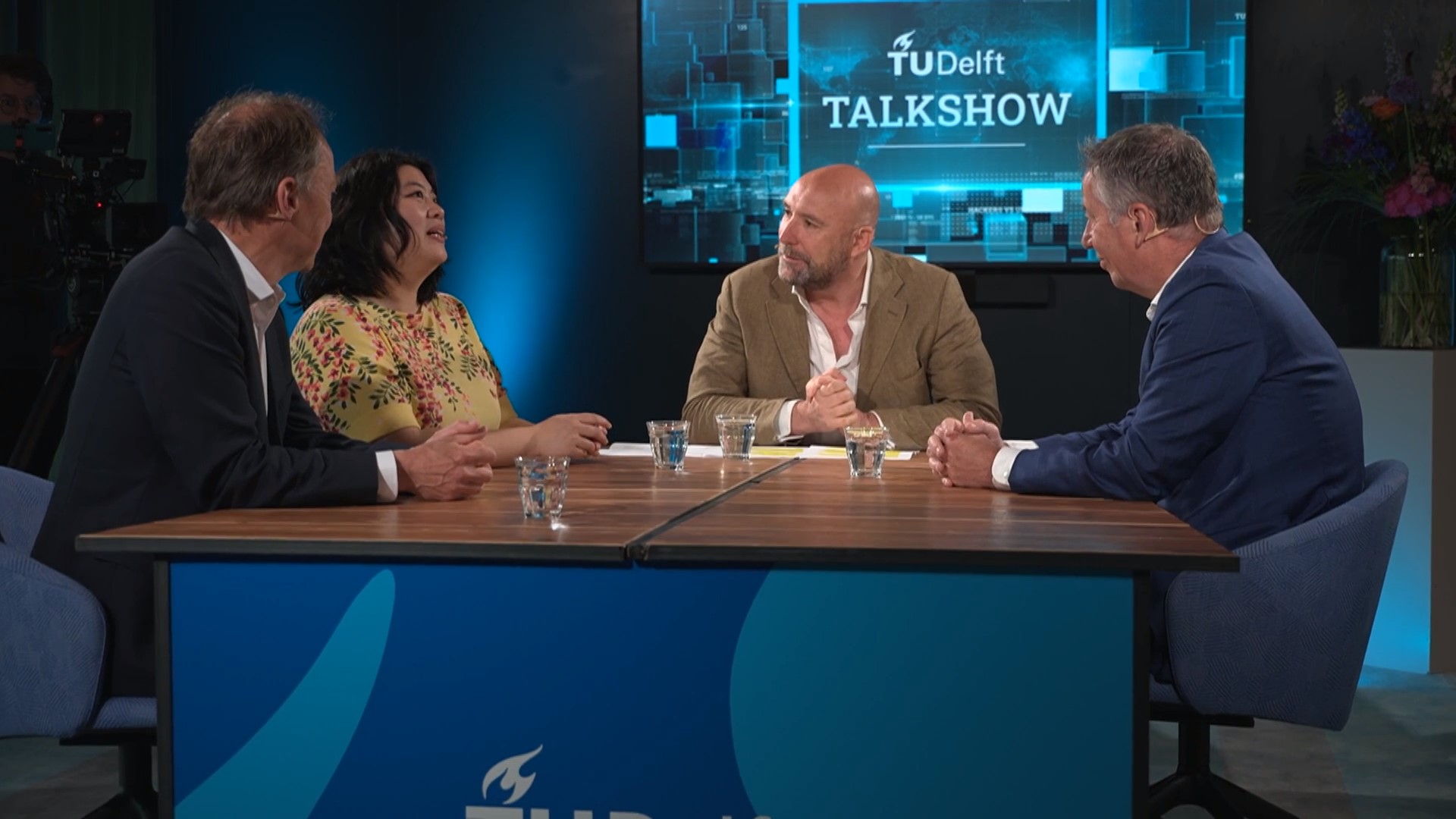Half of TU Delft research is viewed as ‘key technology’. This means that the new Knowledge Security Act will have major consequences. “This is not the right approach.”
Peter Weijland, Cynthia Liem, Leon Heuts and Tim van der Hagen (left to right) at the TU Delft Talk Show on knowledge security. (Video still)
This was said by Peter Weijland, the Knowledge Security Programme Director, during the TU Delft Talk Show of 8 June 2023 about the subject of the same name. The other speakers were Tim van der Hagen, Rector Magnificus and Executive Board Chair, and Cynthia Liem, Associate Professor and member of the Integrity Board. With the support of the moderator Leon Heuts, the Director of the Public Lecture Series, they discussed the consequences of the forthcoming Screening Knowledge Security Act on TU Delft. The Wet voor het Toetsingskader ongewenste kennis- en technologieoverdracht (screening act for undesirable knowledge and technology transfer) as it is officially called, should take effect on 1 January 2025.
It is a Dutch law that is intended to avoid technological knowledge from falling into the wrong hands. The list of ‘key technologies’ that is of economic or military significance to the Netherlands, is long and growing. During the Talk Show, Weijland estimated that it covers half of the research at TU Delft. By extension, the question is then what are the ‘wrong hands’ and who qualifies for screening. The European Union is often taken as the boundary, which would mean, for example, that all non-European Union PhD candidates would not be welcome anymore without first being screened.
Bad jokes on the work floor
Rector Tim van der Hagen said that he considers this to be random. “As though all Europeans or all Dutch people display unsuspicious behaviour. We have criminals here too that misuse knowledge, don’t we? Then screen everyone, regardless of their country of origin.” Liem and Weijland agreed. This would also put an end to the bad jokes on the work floor about uncertainty about contracts which, Liem says, non-European Union PhD candidates already have to deal with.
‘This law is not the right approach’
Van der Hagen is also concerned about the wavering Government policy. “For 15 years we were encouraged to establish partnerships with China. One delegation had barely returned when the next one left. And suddenly every Chinese doctoral candidate is under suspicion.”
“We may have been too naive in the past,” said Van der Hagen, pointing to himself. “We no longer accept PhD candidates from Chinese military academies.”
This was brought to the fore by Delta in this story: Chinese scientists at TU Delft target military knowledge.
“For 30 years we believed in the power of open international cooperation,” noted Weijland. “But we now see that dark forces are undermining open scientific systems. A type of academic self-protection is needed. I understand that it happens, but I do not believe that this law is the right approach.”
Loss of scientific talent
This feeling has wide support. Saar Slegers, an investigative journalist, made a podcast (Vriend of Vijand, friend or foe, in Dutch) about the practical objections of the Dutch knowledge security policy, which clearly shows this.
Van der Hagen, Weijland and Liem said that they expected the screening procedure of PhD candidates from outside the EU to cause a three month delay, and this would lead to top talent not choosing to come to the Netherlands anymore. The chance of losing academic talent is significant, they fear, and would definitely be the case as it would be because of a law in the Netherlands that does not apply to other EU countries.
As an alternative, TU Delft is experimenting with so-called ‘moral debates’. These are meetings that last a few hours in which co-researchers and other experts sit with a researcher that is struggling with an ethical dilemma and think through various core values such as security and academic freedom. The Faculty of Electrical Engineering, Mathematics and Computer Science ran a pilot project on this last year.
Other moral issues
The message seems to be to make the academics accountable rather than a central agency. Van der Hagen said that when he was Director of the Reactor Institute, it was common practice to check the background of applicants and PhD candidates and to have a meeting with them before they were accepted. He suggested that this type of mutual consultation could be made part of the procedure.
The moral debate, that will now be piloted throughout TU Delft in view of knowledge security, is expected to also be used for other moral issues. The areas given were: artificial intelligence, collaboration with the fossil fuel industry, collaboration with the defence industry, and artifical living cells. The debate has only just started.
- Come and discuss knowledge security at the Knowledge Security: Why, how and the industrial perspective on collaboration symposium on Friday 23 June in the Aula. Registration is open to all TU Delft staff members. For more information and to register see the registration page.
- The 8 June talk show can be viewed here.
Do you have a question or comment about this article?
j.w.wassink@tudelft.nl


Comments are closed.